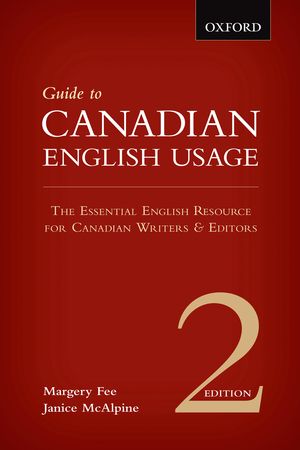
We editors have our own celebrities. At the March meeting of Editors BC, which featured Stefan Dollinger, editor-in-chief of the DCHP-2 (A Dictionary of Canadianisms on Historical Principles, second edition), a name on the guest list caught my eye. Could it be? Really?
It was.
In the audience was Margery Fee, associate editor of the DCHP-2 and — hence my trembling — author, with Janice McAlpine, of the Oxford Guide to Canadian English Usage.
Kindly, Fee took my starstruck babble in stride and agreed to meet for an interview. Here are the highlights.
___
roots, routes
Fee is an emeritus professor of English at The University of British Columbia, where she has taught since 1993. But her roots are in Ontario; her PhD is from the University of Toronto.
As for Fee’s route to usage fame, she was, in the words of a friend, “let into the academy by the fire escape.” In the mid-’80s tenure-stream positions were rare, so Fee decided to teach English in Japan. Step 1 was an applied linguistics diploma at the University of Victoria. “One of my profs there said, ‘There’s this funny little outfit at Queen’s doing something with Canadian English. They might have a job. Why don’t you apply?’”
The catch? The hiring committee wanted a linguist. “What they didn’t realize,” Fee said, “is that linguists don’t like usage. It’s an embarrassment to them. Back then there were no databases. Linguists saw usage as subjective, the product of ideological hate sessions.”
Linguists did not line up for the job. Fee got it, and in 1987 headed back east.
enervation, innovation
Surprisingly, the usage project at the Strathy Language Unit at Queen’s turned out to involve data. Fee’s predecessor had begun compiling a digital corpus — this at the dawn of the digital age.
“When I arrived, we had two million words,” Fee said. Deciding how to store and search that much data was a head-scratcher. Fortunately, as Fee explains in a blog post on the usage guide, the task became an exercise in innovation, not enervation. Thanks to the unit’s ingenious use of basic software and hardware, including “a $40,000 scanner so expensive they kept it hidden away,” the corpus swelled to 12 million words by 1997, when the first edition of the guide came out.
everyone, everybody (their)
The guide also broke ground with its progressive rulings. Take the singular their. The discussion, under “everyone, everybody,” points out that this usage enjoyed a long, uncriticized history until “18th-century grammarians decided that it was incorrect.” The entry notes: “Eventually, one hopes, ‘everyone…their’ will regain its good standing in all levels of writing, and evasive tactics such as these [using his/her or making the antecedent plural] will be unnecessary” (quoted from the second edition, 2007).
What led Fee, a dozen years ago, to such a prescient position? She shrugged. “I’m a feminist. So is Janice McAlpine, who worked for me and later took over as the unit’s director. Is that why? I don’t know. It just seemed like the right approach.”
disinterested, uninterested
Fee’s response to the singular they was not the impassioned creed I had expected. In fact, the more we discussed usage, the more I was struck by her detachment. “Who really cares about fewer and less?” she asked at one point. “There are more important things to spend your time on.”
What? Doesn’t every usage writer harbour a bone-deep fervour for words and correctness?
“I had always wanted to write a reference book,” Fee conceded. (As an MA student, she produced Canadian Fiction: An Annotated Bibliography.) “But really, I took the job at Queen’s because it was tenure stream. My work on usage was kind of accidental.” Fee’s true vocation runs toward Canadian and Indigenous literatures, which she has focused on at UBC.
This casualness was not what I expected. Yet on reflection, I wonder if Fee’s disinterested (but not uninterested) approach to usage is precisely what makes the Oxford Guide to Canadian English Usage so balanced. Perhaps having limited personal stake in a topic that so often inspires peevishness and indignation is what catapulted the book, and its author, to editorial stardom.
___
Previous post from Frances Peck: Freedom to Read, Willingness to Edit.
The Editors’ Weekly is the official blog of Editors Canada. Contact us.
Discover more from The Editors' Weekly
Subscribe to get the latest posts sent to your email.
